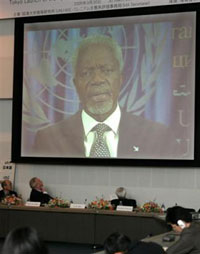 |
| Participants in a meeting on the
Millennium Ecosystem Assessment listen to U.N. Secretary
General Kofi Annan speaks through a video at the U.N.
University in Tokyo Wednesday, March 30, 2005. (AP
Photo/Katsumi
Kasahara) | |
Growing populations and expanding economic
activity have strained the planet's ecosystems over the past half century,
a trend that threatens international efforts to combat poverty and
disease, a U.N.-sponsored study of the Earth's health warned on Wednesday.
The four-year, $24 million Millennium Ecosystem Assessment found humans
have caused heavy damage or depleted portions of the world's farmlands,
forests and watercourses.
Unless nations adopt more eco-friendly policies, increased human
demands for food, clean water and fuels could speed the disappearance of
forests, fish and fresh water reserves and lead to more frequent disease
outbreaks over the next 50 years, it warned.
"This report is essentially an audit of nature's economy and the audit
shows that we have driven most of the accounts into the red," Jonathan Lash, a member of the
Millennium Ecosystem Assessment board, said in London.
The report said degradation of ecosystems was a barrier to achieving
development goals adopted at the U.N. Millennium Summit in Johannesburg,
South Africa in September 2000: halving the proportion of people without
access to clean water and basic sanitation by 2015 and improving the lives
of 100 million slum dwellers
by 2020.
Walter Reid, director of the Millennium Ecosystem Assessment, said over
the past 50 years humans had changed ecosystems more rapidly and
extensively than any comparable period in human history.
"These changes have resulted in a substantial and largely irreversible loss to the biological
diversity of the planet," Reid said.
U.N. Secretary-General Kofi Annan said the Millennium Ecosystem
Assessment "tells us how we can change course," and urged nations to
consider its recommendations.
The study was compiled by 1,360 scientists from 95 nations who pored
over 16,000 satellite photos from the U.S. National Aeronautics and Space
Administration, and analyzed statistics and scientific journals.
Their findings highlight the planet's problems at the end of the 20th
century, as the human population reached 6 billion.
Conservation groups called on governments, businesses and individuals
to heed the study's warnings.
(Agencies) |
本周三(3月30日),聯合國主持的一項“地球健康狀況”研究活動對人們發出預警:在過去半個世紀中,人口的不斷增長和日益繁多的經濟活動使地球的生態系統不堪重負,這種趨勢向致力于消除貧窮和疾病的國際力量敲響了警鐘。
這項歷時四年,耗資2400萬美元的“千禧生態系統評估”顯示,人類對地球上的農田、森林和河道造成了巨大的破壞,其中的部分資源已經衰竭。
報告還警告說,在今后50年內,如果各國不采取更有利于生態環保的政策,人類對食物、凈水和燃料的不斷需求將加速森林、魚類和新鮮水資源的消失,并導致疾病更加頻繁地爆發。
千禧生態系統評估委員會的成員喬納森·拉什在倫敦說:“這份報告本質上是對‘自然的經濟’的一次審核,結果顯示我們的大部分賬戶上已經出現了赤字。”
報告指出,生態系統的惡化已經阻礙了聯合國千禧(地球)峰會(2000年9月在南非約翰內斯堡舉行)制定的發展目標:到2015年,使不能獲取凈水和基本衛生設施的人口比例減半;到2020年,使居住在貧民窟的一億人的生活得到改善。
“千禧生態系統評估”的負責人沃爾特·里德說,在過去50年中,人類對生態系統的改造比歷史上的任何時期都更為迅速而廣泛。
里德說:“這些變化導致地球上的生物多樣性發生了幾乎不可挽回的重大損失。”
聯合國秘書長科菲·安南表示,千禧生態系統評估“教我們如何改變事物的發展進程”,并呼吁世界各國認真考慮評估組提出的建議。
這項研究由來自95個國家的1360名科學家協力完成,他們閱覽了美國國家航空航天部提供的16000張衛星照片,并對所得數據和一些科研期刊進行了分析。
他們的發現進一步凸顯了隨著20世紀末地球人口達到60億,這顆行星出現的種種問題。
各類自然資源保護組織紛紛號召政府、企業和個人對研究提出的警告予以重視。
(中國日報網站譯) |
